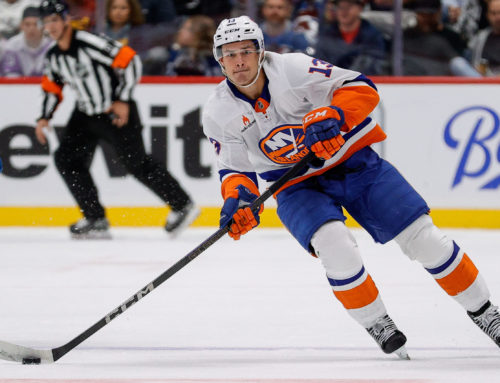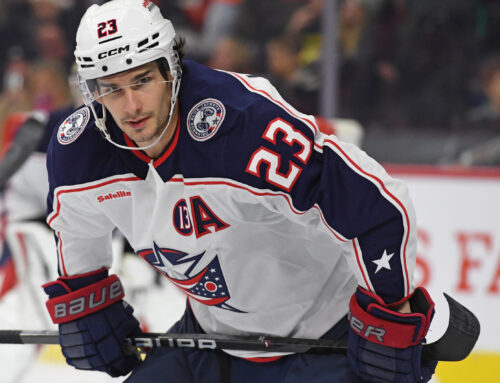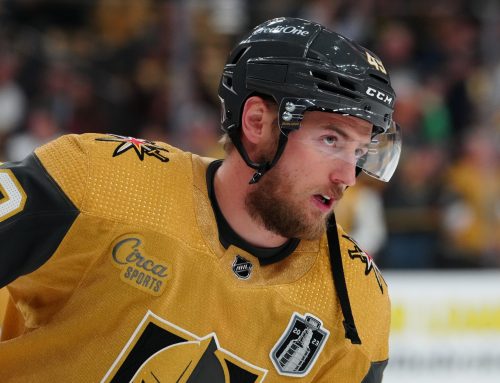With so few games in the books as of the writing of this article (Thursday, October 10th) it is hard to dig into too many specific happenings. We will hit a couple as they are relevant to our topic, but we are actually going to dig into a little bit of past data in order to give a little bit of context for what we are all about to experience.
Every year, we as fantasy managers, eagerly anticipate the start of the season. We are also usually extremely twitchy when it comes to dropping players we were previously excited about and jumping on any indication of production. There are a lot of examples of this working out and players becoming season long holds. But basically, the question for today is what expectations should we have for October? What happens to all of those players who get hot at the start of the season?
To put some numbers to this I pulled a few reports from the Dobber Reports page. We are looking at full-season 2023-24 point paces, point pace data from October of 2023, and finally a player's three year average. All of these come from various Big Board reports, using the custom date selection functions.
There are a few things we can know right off the bat. The first is that there were 64 players who averaged a point per game or higher in October. By the time we get to a full season's worth of games that number dropped down to 34. This is a very unsurprising result, of course the smaller the data sample (five to eleven games in October versus a whole season) the more variation we are likely to see and as the sample gets larger the numbers change.
On the flip side, of the 34 players who were point per game at the end of the season, 24 were at a point-per-game level during October. This means that 40 of the players who earned point-per-game status in October did not end up at a point per game pace by the end of the season. To put these numbers in percentages, if you had a point per game player in October there was a 62.5% chance they were not a point per game player by the end of the season. Short take away? Being a point per game over a small sample of games is not very indicative of being able to sustain that over the long term. I know, shocking.
We can also say that if a player was a point per game player at the end of the season there was a 70% chance they were in October. Of those 34 who ended the season at a point per game pace, only seven had a three-year average of less than a point per game. And all but one had a three-year average of more than 77 points. So again, another not very shocking result of a player who has not put up a point per game season before is way less likely to do so than a player who has done it before.
Things do get a little more interesting when we remove filters and actually look at some of the rest of these players. For instance, 41 of the 65 players (63%) who were point per game in October ended the season exceeding a 70-point pace, and 54 of the 65 players (83%) were above a 60-point pace. So, if you have a player who finished October at a point per game, there is still a better than 60% chance they will be a 70-plus-point player by the end of the season. That seems quite a bit more optimistic.
Since a lot of that is made up of elite players who have done it before, let's dig a little deeper on a few of those players who did not have a three-year average above a point per game. If you jumped on available players who were a point per game in October you might have been able to grab players like Brock Boeser, Noah Dobson, William Karlsson, and Wyatt Johnston. In a shallow league you may have even been able to grab a Sam Reinhart. You may have also instead grabbed an Evan Rodrigues, or a Ryan Strome, which would have been less fortunate as they ended up in the 40-point pace range.
Brock Boeser started with a four-point game and then went on to put up 10 points in nine October games. He also put up 25 shots and was consistently getting 19-plus minutes a night in a top six role, and on the top power play. He finished the season on a 74-point pace with a 19.6 shooting percentage.
Ryan Strome started out with 11 points in nine October games. Unlike Boeser though he was not always getting top unit time and was seeing significantly less overall ice time (15-16 minutes). Both of those continued to fall off over the course of the season as well. He ended up with a 43-point pace on the season.
The point here is that the headline numbers from the small sample are great ways to get noticed, but there needs to be some underlying reason to believe in future success, things like access to the top six, big minutes, and top power-play time. With that in mind, let's take a look at a few of our tiny one game samples.
Ivan Barbashev had four points and two shots in his first game. He had some good even strength deployment, playing with Mark Stone and Jack Eichel, but basically no power play time. He has been averaging a 45-point pace over his last two seasons so I might need a little more than his usual 16 and half minutes and no power-play time to think he is going to sustain the pace through October, let alone the entire season.
We saw three-point nights from Mason Appleton and Shea Theodore. Appleton was on the third line in Winnipeg (though often the second line by total ice time) and got zero power-play time. Count that one as unlikely. Theodore, though, has been on the top unit and has averaged a 67-point pace over his last two seasons. There is a lot of competition in Vegas right now, but as long as he keeps that top power-play deployment there is a lot to like there.
We also have a bunch of players who currently have two points in their single game. I would highlight Alexis Lafreniere, Barrett Hayton, and Jordan Kyrou who are all getting top line and top power-play deployment for their clubs (and Hayton had a goal in Thursday night's game). They should be very interesting to essentially all managers until that deployment changes.
That is all for this week.
Do your part to support organizations working to make hockey for everyone.





 FLA
FLA CHI
CHI NYR
NYR PIT
PIT L.A
L.A COL
COL BUF
BUF UTA
UTA PHI
PHI STL
STL VAN
VAN CBJ
CBJ TOR
TOR NSH
NSH
